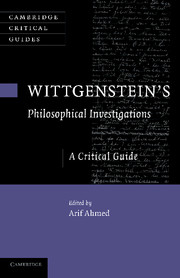Book contents
- Frontmatter
- Contents
- List of contributors
- Acknowledgments
- Introduction
- 1 From referentialism to human action: the Augustinian theory of language
- 2 What's doing? Activity, naming and Wittgenstein's response to Augustine
- 3 Measure for measure? Wittgenstein on language-game criteria and the Paris standard metre bar
- 4 Wittgenstein on family resemblance concepts
- 5 Wittgenstein on concepts
- 6 Wittgenstein vs contextualism
- 7 Wittgenstein and the linguistic turn
- 8 Rorty's Wittgenstein
- 9 Are meaning, understanding, etc. definite states?
- 10 Another strand in the private language argument
- 11 Deductive inference and aspect perception
- 12 Remembering intentions
- Bibliography
- Index
10 - Another strand in the private language argument
Published online by Cambridge University Press: 06 July 2010
- Frontmatter
- Contents
- List of contributors
- Acknowledgments
- Introduction
- 1 From referentialism to human action: the Augustinian theory of language
- 2 What's doing? Activity, naming and Wittgenstein's response to Augustine
- 3 Measure for measure? Wittgenstein on language-game criteria and the Paris standard metre bar
- 4 Wittgenstein on family resemblance concepts
- 5 Wittgenstein on concepts
- 6 Wittgenstein vs contextualism
- 7 Wittgenstein and the linguistic turn
- 8 Rorty's Wittgenstein
- 9 Are meaning, understanding, etc. definite states?
- 10 Another strand in the private language argument
- 11 Deductive inference and aspect perception
- 12 Remembering intentions
- Bibliography
- Index
Summary
INTRODUCTION
The title of this chapter is borrowed from John McDowell's ‘One strand in the private language argument’ (1998b). In that paper, he argues that much of what is best in Wittgenstein's discussion of private language can be seen as a development of the Kantian insight that there is no such thing as an unconceptualized experience – that even the most elementary sensation must have a conceptual aspect. On McDowell's view, a sensation is a ‘perfectly good something – an object, if you like, of concept involving awareness. What is a nothing … is the supposed pre-conceptual this that is supposed to ground our conceptualizations’ (1998b: 283). McDowell's Sellarsian objections to the notion of the Given in that paper are an insightful and illuminating development of Wittgenstein's discussion of the topic. However, McDowell's recoil from the notion of an unconceptualized experience, a conception of sensation on which it turns out to be ‘simply a nothing’ (ibid.), leads him to reject Wittgenstein's cryptic proposal that a sensation is ‘not a something, but not a nothing either’ (PI 304). Instead, McDowell embraces the opposed view on which every experience is a ‘perfectly good something’ (1998b: 283), something of one kind or another, for it must be possible to bring it under the appropriate concepts. What McDowell misses here, I believe, is that a central aim of Wittgenstein's discussion of our supposed ability to refer to inner objects is to attack the very idea of ‘pre-linguistic awareness … as a substratum on which the capacity for concept-carried awareness is constructed’ (ibid.).
Keywords
- Type
- Chapter
- Information
- Wittgenstein's Philosophical InvestigationsA Critical Guide, pp. 178 - 196Publisher: Cambridge University PressPrint publication year: 2010
- 3
- Cited by

